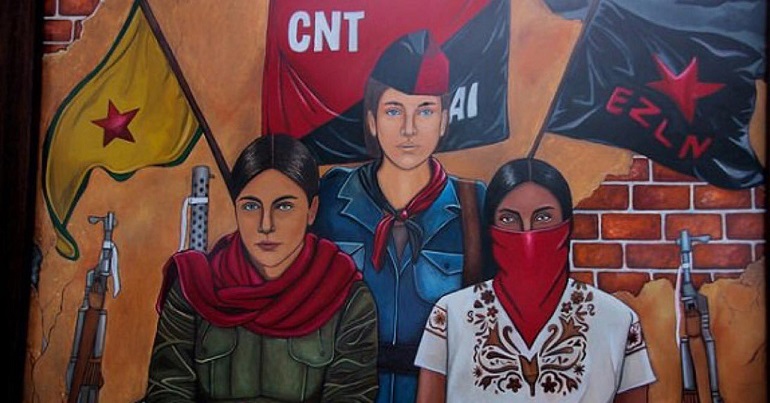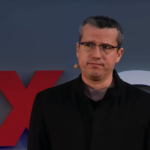From Spain to Syria – a Green revolution against fascism today

The Spanish civil war (1936 to 1939) and the fight against Franco there by anti-fascists, is part of our own movement’s history. Many British workers, mostly from the connections made via the strong trade union movement of the time, as well as other anti-capitalist and anti-imperialist organisers, made the difficult journey to Spain, then into a war-zone, to fight alongside Spanish comrades.
If the same thing was happening in the world today you might therefore imagine that it would be being talked about by organisers resembling those of the late 1930s.
Yet something almost identical is happening today, though geographically further from this island. A struggle that is almost 10 years old, continues in the face of often advancing fascist oppressors, in the northern part of Syria, after the Syrian Civil War broke out of Arab Spring uprisings in the country.
The Kurds in northern Syria have long been oppressed by both the Syrian state, and Turkey to the north, which has been in a war of its own with the Kurdistan Workers Party (PKK). Kurds have been denied their own state after colonial European countries divided up the Middle-East in their own interests. And so as the Syrian government’s forces were concentrating on repressing the uprisings of citizens such as those in Aleppo, and other major Syrian cities, the Kurdish people of Rojava (the West) – one of the four parts of ‘Greater Kurdistan’ began to use the freedom that this brought to create an autonomous region, administering their own affairs separate from existing states. The added significance was that this was also founded on the 3 principles of Direct Democracy (Democratic Confederalism), women’s liberation and ecology.
At the same time, the fascist Islamic State (ISIS/ISIL) – more frequently now known as Daesh – was growing its own territory in Syria, and where it was close to the Kurdish areas, it was brutally attacking Kurds and kidnapping Kurdish and Yazidi young women, among other horrendous war-crimes.
While reports on Daesh were very frequent in Western and British mainstream media, less commonly reported has been the movement in Rojava itself to establish a distinct area on principles that most people wouldn’t expect to find in the so-called Middle-East. Perhaps the very idea of this area existing at all, now named ‘Autonomous Administration of North and East Syria’ is sufficiently alarming for the powers-that-be, that they might prefer if people didn’t notice its existence in any substantial way.
Anna Campbell, an intersectional feminist from Lewes, Sussex, who was active in movements including the anti-austerity movement, and various climate movements in the south of England was one person who took action into her own hands, to not only raise awareness of the existence of the growing anti-fascist resistance there, and associated movement for a free community, but to go and take part in the fight for its survival, just as trade unionists and organisers did in the 1930s. Tragically Anna, also known as Hêlîn Qereçox, was killed by a Turkish air-strike while fighting to defend Afrin from a Turkish military invasion.
Many Kurdish activists argue that there is substantial evidence that Turkey and Daesh have, in the least, some kind of military alliance in the region, and at most, a more explicit relationship or association.
One major ongoing controversy between the Kurds and the Turkish state, is the continued imprisonment of Abdulah Öcalan, the Kurdish ‘father’, or spiritual/philosophical leader, who has been in prison on a small Turkish island since 1999, mostly in solidarity confinement. Many have compared him to Nelson Mandela, and have called for fairer access to his lawyers and other visitors.
Abdulah Öcalan had managed to read some of the writings of American social theorist Murray Bookchin, and was inspired by his writings about social ecology to write about Democratic Conferdalism as a way forward for the Kurdish struggle. Öcalan is credited for the founding principles of the ‘Autonomous Administration of North and East Syria’ (Rojava).
But why isn’t more of this known about by left activists in the West? Why don’t we mobile for the release of Abdulah Öcalan in the same way that activists in the 1980s, famously including Jeremy Corbyn MP, mobilised again and again against apartheid and for the release of Mandela?
What has stopped this being as significant as the fight in Spain was for our movements? Is it just that it is further away? I would hope that there wouldn’t be an unconscious distinction between comrades in such need in the West, and non-European comrades. Perhaps the most likely scenario is that our alternative news sources are just not on the level of influence that left-leaning newspapers had in the 1930s.
Perhaps for Green Party activists there might be a fear that taking sides in such a ‘far-away’ conflict risks alienating diaspora voters of one side or another. But it also shouldn’t be about votes – our actions and responsibility should be about doing what is best for our planet. If a call for solidarity for a society based on principles that include ecology is made, that should be weighed on its own merits. Votes should come after principles.
Many Green Party activists have declared support for the Extinction Rebellion demand for citizens assemblies. We should also explore support for Kurdish Assemblies in our neighbourhoods where they are active.
I also propose to explore the potential for a ‘Friends of Rojava’ group for the Green Party of England and Wales – such as the Greens and other UK parties have, for example ‘Boycott, Divestment and Sanctions (BDS)’ or ‘Friends of Palestine’ groups, and other associated organisations and interest groups.
Please email greenfriendsofrojava[at]gmail.com to declare an interest or find out more.
Now in its 10th year of existence, it’s time to support the Kurdish ecological movement, for a model of municipalism that can and should inspire more people to build a world based on principles that we should be proud to promote, advocate and champion.
PS. We hope you enjoyed this article. Bright Green has got big plans for the future to publish many more articles like this. You can help make that happen. Please donate to Bright Green now.


Leave a Reply